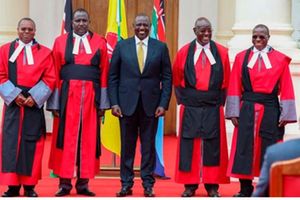
An empty Kenyatta Avenue in Nairobi when businesses in the city remained closed in July last year due to protests against the high cost of living.
These days it feels like Kenya is hurtling down from cruise altitude towards the hard ground, below. Along the way we are meeting countries which are climbing, growing, while our key statistics are going backwards: Tanzania has overtaken Kenya in tourist arrivals, Kenya has lost $200 million worth of exports to Uganda in a dispute over the “G-to-G” oil deal; Uganda is Africa’s leading exporter of coffee, eclipsing Kenya and Ethiopia; the Kenya shilling is on a downward spiral, other regional currencies are holding relatively steady.
In the countryside, our zone is going to have a bomb of a grain harvest because of the good rains and because we didn’t listen to those saying there wasn’t going to be an El Nino. We planted a higher-yield but longer maturing maize variety.
I expect to have a harvest that is between three and five times what I had last season and I’m not alone.
So I thought Kenya was going to have a big enough store of maize to tide us over poor harvests for the next five or so seasons. Even I, alone, given the resources, I can buy, dry, treat, store and do a managed release of a national reserve, for the next two years.
Another farmer cynically pointed out that our harvest will all have been exported in a matter of weeks, even though it is not permitted. And down went my optimism.
We are a divided, sullen and pessimistic nation, partly because of the residual resentment and questions over the election, partly because of the difficult economic environment and partly because of the abject failure by the ruling party to unite and mobilise the country.
The open favouritism, relentless aggression of the ruling classes and the endless blame-gaming create the illusion that the country is collapsing.
The loss of confidence in the government is almost painful to see. The current heckling and chants of “bye bye” barely a year after massive campaign rallies and dances for Kenya Kwanza leaders are a shock, to say the very least. If the trend continues, and if the leaders continue responding to public anger with fury, scolding and arrogant threats, God knows what won’t happen.
Kenyans feel that they were sold snake oil, they were hoodwinked with false promises and that they are being played for fools. You know, even fools don’t like to be played for fools. Key appointments which have caused an outcry because the appointees are not perceived as competent or deserving have cemented the perception, in some quarters, that the new team has no clue what it is doing.
An excess of campaigning (rather than being seen to be working), publicity stunts and a disrespect for the general intelligence of the populace (such as by opening projects implemented years ago) or taking credit for work by other governments or constant blame gaming risks doing something even quite corrosive – eroding the personal respect of the public for individual leaders and replacing it with contempt. Contempt is not just a deal breaker at the election, contempt, once contracted, is incurable.
The economy is perceived as having tanked. The majority are not feeling the growth and rosy statistics being peddled by the government.
The Kenya shilling has lost nearly a third of its value and appears to be on a free fall, which many proud and hardworking Kenyans consider shameful and a disgrace because they like a strong currency.
Massive job losses have caused pain in families, including well-to-do families, which have had to recall their children from college abroad. The debt monster, another national embarrassment, has been made more frightening by the devaluation of the shilling and there seems to be no method to the madness from the Presidential economic team, just acerbic wisecracks and adenoidal homilies suggesting that the disaster was caused by the middle-class.
Kenyans are scared of leaders who don’t obey the law. I think it comes from the atrocities of the Moi regime when people were jailed without trial, priests such as Father Kaiser were killed, dissidents had their nails pulled out in the Nyayo House torture chambers and university professors had their testicles squeezed in Nyati House.
If one thing is likely to cause large-scale trouble, it is the perception of loss of democratic gains after two decades of being beaten by the GSU in the streets. The collapse of the rule of law – if the most powerful person in a country does not obey the law, there is no rule of law – the assault on the Judiciary and disrespect for public opinion, the failure of Kenya Kwanza leaders to respect others, creates the perception of the rise of a new dictatorship.
And then, finally, there is the perception that the leadership is prescribing belt-tightening, hardship and pain for the rest of us and Sh8 million watches for itself.
If you add the perceived loss of sovereignty, national prestige and what some might see as the almost willful mismanagement of the diplomatic relations with our neighbours, most valued trading partners and allies, then you have a really big problem.
It is not too late, though. We hope and pray that the ruling classes can still summon the humility to step back from the edge of the precipice.







